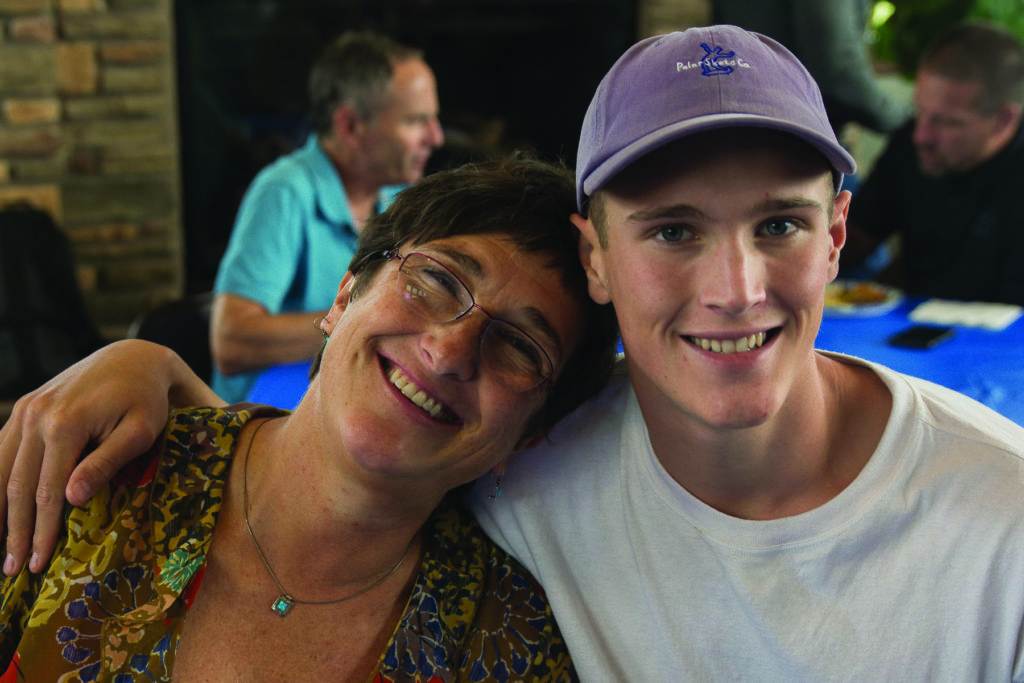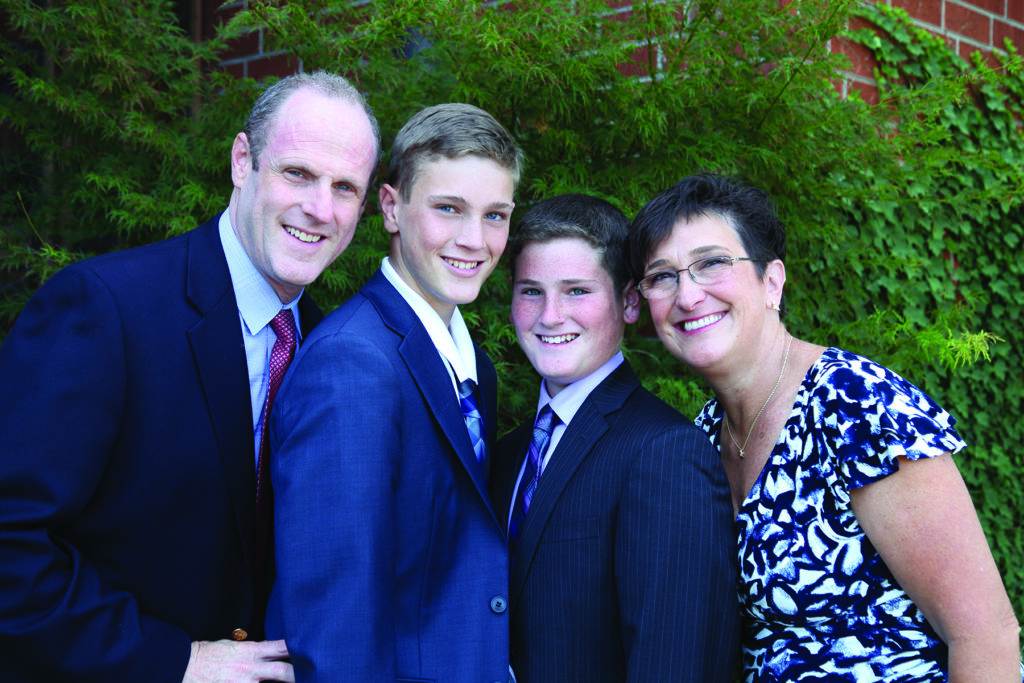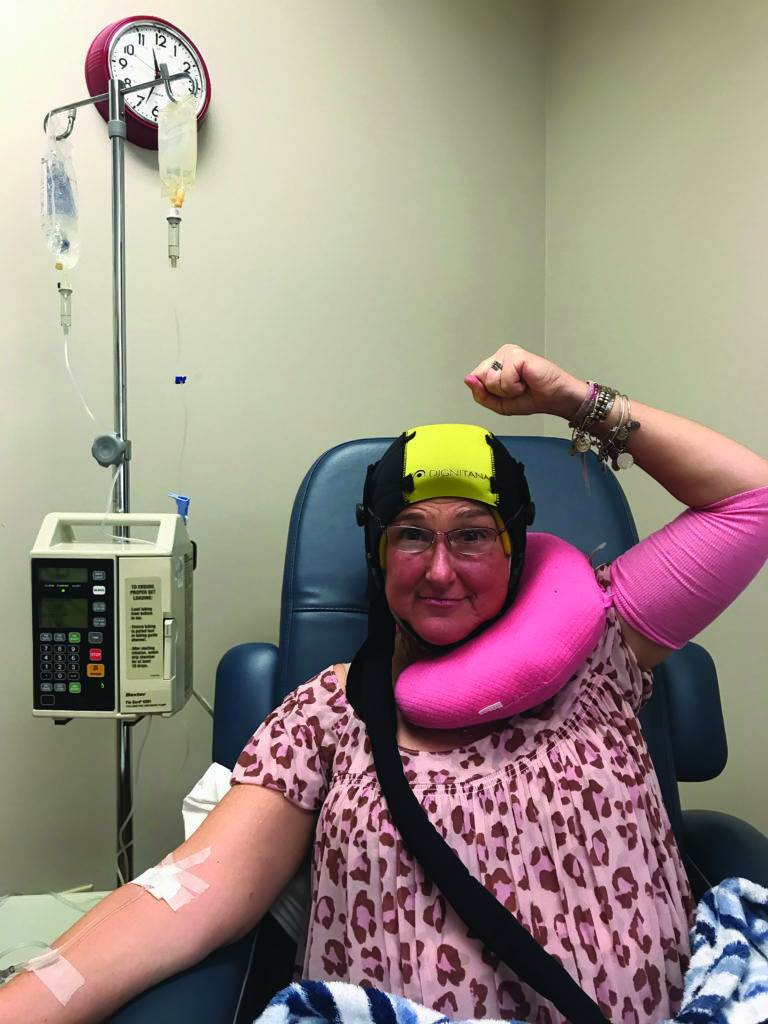A Marin Mom Who Lost Her Son to Fentanyl
Michelle Leopold grew up in Alameda and graduated from UCLA. After a marketing and advertising career in San Francisco she teamed up with her husband, Jeff, to operate a small family chain of local hardware stores.
On November 17, 2019, their elder son, Trevor, died of an accidental fentanyl overdose in his dorm at Sonoma State University. He was 18. Their younger boy, Parker, is a 17-yearold high school student.
Michelle, a lifelong volunteer currently battling breast cancer with chemotherapy, is deeply committed to drug and gun violence education and the 12-step programs related to addiction. We sat with Michelle, surrounded by Jeff and their two big dogs, Maverick and Bowzer, and many family photos, for a poignant conversation in their living room.
Common Ground: Just before Thanksgiving, I witnessed you at a burial ceremony lowering Trevor into the ground, something I will never forget. I can’t imagine what you were feeling.
Michelle Leopold: Disbelief. Heartbreak, agony, pain. Just so much heartache. It’s inconceivable still, two weeks later.
What happened to Trevor?
The toxicology report from the coroner’s office revealed that he had ingested Xanax laced with fentanyl, a street drug he purchased from a dealer.
The irony is that we were sitting next to each other this summer at a service for another local boy who died from an inadvertent fentanyl overdose. It happened on his 19th birthday. He was just having a night of partying.
You would think that Trevor would’ve learned a lesson from that, and we’ve heard that multiple friends warned him not to buy street drugs, especially after the other boy’s death.


Until Prince died from fentanyl I’d not really heard of it. What’s your take?
It’s an epidemic. Ten thousand people in the Bay Area have died from overdoses, mostly because of the fentanyl addition happening in black market drugs. [Starting to cry] It’s horrific and something needs to be done. It’s pervasive and being added without people’s knowledge to black market drugs. A lot of it is found on the so-called dark web. Who knows how people are getting it. Just a couple of pieces of fentanyl the size of a sugar granule can kill you.
We all knew Trevor. He certainly didn’t have a death wish.
That is what we truly believe, that it was not intended.
What was Trevor like growing up?
Full of heart, a nature lover. He was in Little League, he was a Cub Scout, Boy Scout. He did a huge [crying] fundraiser for the Humane Society for his bar mitzvah. He had a big heart and since his passing, several girls, especially, have come to us saying he was such a good listener, helping his friends help each other out of their problems. He was a bright boy. When he applied himself he could do amazing things.
You’re simultaneously battling cancer, undergoing chemotherapy. It’s an absurd question but how are you holding up?
I don’t really have any idea how I’m standing.
I know you and Jeff have a hardware store business, but it appears that your life purpose is educating people about the drug epidemic—and gun violence.
I am a serial volunteer, always have been, particularly with the kids’ schools and for things like Moms Demand Action for Gun Sense in America. When I got breast cancer, I offhandedly mentioned to my best friends, “Breast cancer’s not gonna be my thing.” They all started laughing, saying, “No, you’re not going to be vice-president of the Susan G. Komen Foundation!” I’ll help other women get through cancer, but I have had the privilege of working five years with gun violence prevention and have a lot of friends that have gone through horrific experiences, losing their own children and loved ones. I’ve seen their strength and ability to persevere through adversity. I am doing my best to emulate these role models. Some moms lost their babies to gun violence. Some were killed in shootings like Las Vegas. Such amazing women [starting to cry]—that’s where I’m going, okay! They’re doing it. I must be able to figure out something. The day Trevor died I turned to a friend and I said, “This is my thing.” I had been protecting Trevor’s story as it was his to tell. Now it’s become our story to tell.
Everyone knows that when you’re fighting cancer the best antidote is a stress free life.
[Loud laughter from Michelle] Ha! Tomorrow’s my last chemo. Then I have three more weeks of shitty side effects, but I am going to survive cancer. Yes, it’s horrific that my son died at 18 and I don’t get to watch him fall in love and maybe have children, but this is our new life and we can’t change that. I choose to move forward, even though it’s really stressful.
Trevor had a Jewish service, so I assume that’s how you were raised. How does faith help at this time?
Jeff was raised Jewish. I was raised in multiple different Protestant churches but at but at 16 I decided I was agnostic and have been ever since. I consider myself spiritual with a strong belief in a higher power because of my 12-step work. Before we got married, we went to an interfaith counseling group to create a path together. I decided not to convert though our boys were raised Jewish. The congregation has been a huge support for us, and especially Jeff.
How does spirituality look for you?
I’ve a 17-year yoga practice and have a daily gratitude meditation practice. I am very big on the Serenity Prayer. I believe in a higher power and that I don’t have a lot of control over my own life—that if I turn my ways over to that higher power or whatever you want to call it—that life will unfold the way it’s supposed to. I get a lot of indications and coincidental sightings since Trevor passed. These are comforting. I like to think that Trevor’s spirit is trying to say, “Hey, I’m here. I haven’t gone very far.” I’m just trusting that there is a reason, a path in all of this. I’ve been practicing asking for help, which is a really hard if you’ve been a control freak and a perfectionist. [laughs] I’ve been practicing “Letting go and letting God.” It’s one of the things they say in 12-step groups.
What about how they say “God will never give you more than you can handle”?
[Loud] Oh, that’s such bullshit! What’s the other one they say? “That which does not kill you makes you stronger.” Bullshit. Those are just things people say to make you feel better. You could quote me on that.
Everyone knows you did everything in your power to help Trevor steer away from addiction. You must take solace in that.
Trevor knew every single day of his life that I loved him unconditionally, whether we were going to rehab or juvenile hall. I’ve no regrets for everything I have done as a mom and that gives me peace.
What’s your message to parents?
Love your children, number one. Trevor knew we loved him. And even though that didn’t prevent him from dying at least I don’t have any regrets. Parents need to get educated and make sure their kids are educated. With this epidemic getting bigger there’s going to be more emphasis in the schools. And parents need to be educated about marijuana, which I strongly believe is a gateway drug. A few years ago I started a website, MyKidSmokesPot.com, to create a research resource. Now it needs to be updated, but parents need to know that the pot out there is not like the stuff we had in high school or college, which was 2-4% THC. The crazy good stuff then, like Maui Wowie, was 6%. Street pot is now closer to 25-30% and the concentrates and dabs approach 90%.

Personally I think that legalizing pot is bullshit. On Trevor’s 18th birthday he got a medical marijuana card from a doctor in Malibu. The form said, “I have seen Trevor in person, and I do believe he needs medical marijuana.” Well, Trevor was not in Malibu on his 18th birthday, but apparently if you go on FaceTime with the doctor that counts. There are lots of issues! And there are good resources out there. Parents should not act like ostriches. Parents need to know their kids’ friends’ parents.
The weaker pot we smoked in our day maybe created some psychological dependence, but it seems these high concentrations are creating actual chemical dependence.
The human brain is not fully formed until you’re 25, so the more you load up those pleasure-seeking pathways, the more your brain is going to say, “I want more of that.” With greater access to this pleasure and stronger concentrations it becomes a neurological issue. And then there’s the social stigma of mental health issues and the normal teen challenges of fitting in. Trevor would use marijuana or drugs perhaps to self-medicate instead of going with the diagnoses and recommendations of medical professionals. That can lead to buying a pill laced with fentanyl.
You’re making a correlation between mental illness and the
drug crisis?
I’m not an expert but that’s my experience. Our country needs to destigmatize mental health issues. Trevor had anxiety but had difficulty owning it or saying, “I’ve huge anxiety and it makes me really uncomfortable.” And we’ve a very open, loving, and supportive household. Still, what are people going to say? He surely didn’t understand what was going on inside his own head and self-medicated instead—leading to addiction.
If we had been able to identify solutions for his mental health issues he might never have become addicted to marijuana and whatever else that followed. In this country when you’re dealing with health insurance and mental health it is an upward battle. Later on, when he was also diagnosed with Asperger’s, that diagnosis just about killed him when he heard it. He didn’t want to accept it. I think he struggled with that to the day he passed away.
Oh god! The destructive power of stigma.
Thank you for not sweeping this under the rug. We were likening this drug epidemic to the early AIDS crisis when people were dying and people were saying, “Those people deserved it.” We’re at the same level of history with people saying, “They deserved it; they were drug addicts.”
It just breaks my heart. What message do you have for teens?
Don’t break your mom’s heart. Don’t do this to your family. Know what you’re putting in your body. Don’t keep your feelings bottled up.
There are resources out there.
Rob Sidon is publisher and editor-in-chief of
Common Ground.